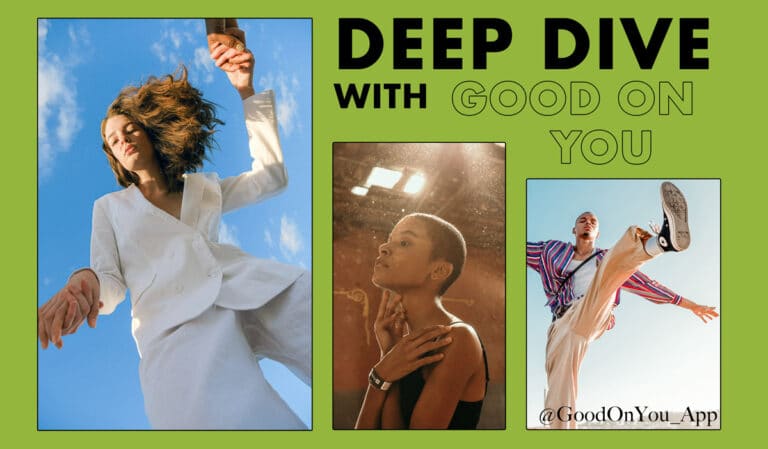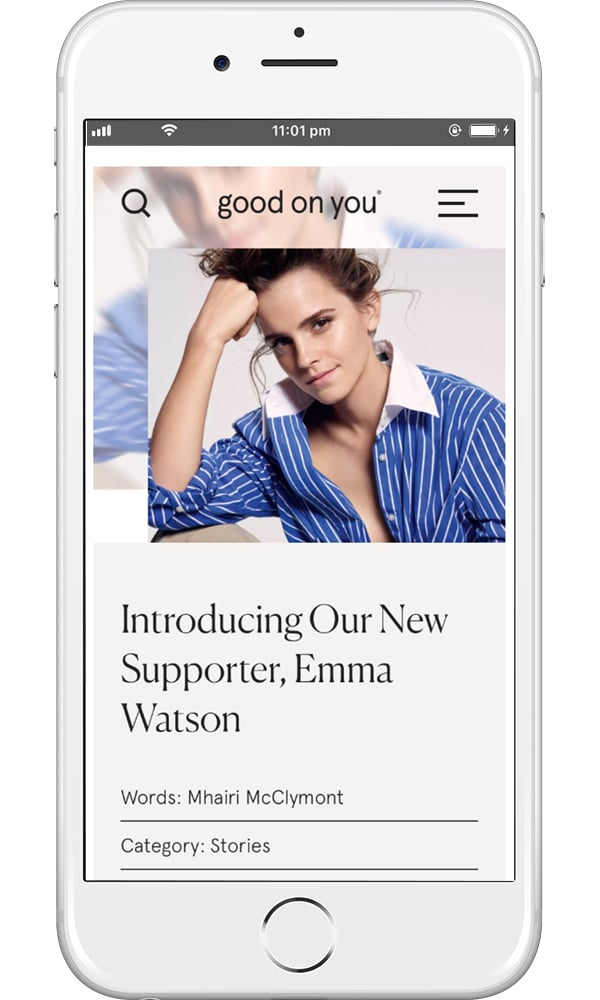Good On You ranks your favourite brands from least to most sustainable

Fashion is fun. The clothes we wear help show off our personality and mood, and develop our sense of style. They allow us to experiment with designs, colours, textures, sizes and more. And these days, there are so many cute and trendy brands that cater to a wide audience, offering different styles and aesthetics so that everyone can find a garment that will make them feel good.
But fashion has a darker side: much of the fashion industry is incredibly harmful to the environment and to people. In fact, it’s one of the most polluting industries in the world, and since the collapse of the Rana Plaza in 2013 (which killed more than 1,000 workers in a Bangladesh factory making clothes for European and American brands), light is being shed on a number of human rights issues within the industry. More recently, after lockdowns started rolling out in March 2020, stories emerged of big fashion brands cancelling orders and leaving vulnerable suppliers high and dry.
Luckily, the tide is turning. In the last few years, there have been more and more signs that consumer demand for sustainable fashion is on the rise. Many more people now actively look for sustainable clothes from ethical brands. An increasing number of fashion brands are taking note of this consumer interest, and new ethical labels and collections are created every day.
Together, we can have a real impact, with the one powerful weapon we all have in common: the ability to choose. By choosing sustainable brands that do good over those that don’t, we’re driving the whole fashion industry to be more ethical and fair.
Voir cette publication sur Instagram
How do we know which brands to go for and which brands you should avoid?
By being curious, doing some research, and asking questions. This is where tools like Good On You become helpful. Good On You is the world-leading sustainability ratings platform for fashion. It reads between the seams of hundreds of reports and pulls all the information together to give each fashion brand an easy-to-understand score. Good On You allows you to know how your favourite brands impact the planet, people, and animals—and discover new brands that are changing the industry for the better.
The Good On You ratings are based on the key idea that you have a right to know how a brand impacts the issues you care about. As citizens and consumers, we have a right to make responsible and sustainable choices. Brands have a corresponding obligation to be fully transparent about how their operations impact the issues consumers are passionate about.
Good On You collects up to 500 data points per brand across more than 100 key sustainability issues, indicators, and standards systems (including Fair Trade, Cradle to Cradle, OEKO-TEX STeP, and the Global Organic Textile Standard). Where available, it brings in relevant data from third-party sources like the Fashion Transparency Index and CDP Climate Change and Water Security projects.
When considering certifications and third-party data sources Good On You takes into account both the scope of the issues covered and the quality of their assurance, for example, how well they ensure brands comply with the standards they set. It doesn’t take any private information from brands, standing firmly in the shoes of the consumers who should be able to find the information, in turn incentivising greater transparency and progress from brands.
Good On You’s system aggregates this data into a simple 5 point score—from 1 ‘We Avoid’ this brand to 5, this brand is ‘Great’. You can find Good On You’s ratings on its app and directory, which list nearly 3,000 brands from all over the world.

5 trendy brands falling short on sustainability
Here are a few examples of trendy brands listed on Good On You that don’t make the grade on important ethical and sustainability criteria:
SHEIN (We Avoid)
One of the fastest growing online fast fashion retailers, SHEIN was founded in 2008 and now boasts an Instagram following of over 18 million people. It sells clothes at alarmingly low prices and of very dubious quality. No stranger to controversy, in 2020 the brand was accused of selling offensive items, from Islamic prayer rugs as decorative mats to a necklace in the shape of a swastika.
SHEIN relies on social media influencers for its marketing, and appeals in particular to young women on a budget, but when it comes to how it impacts people, the planet and its animals, it’s as opaque as a brand can get. You’ll be hard-pressed to find a contact number on the website, let alone information about their supply chain.
SHEIN receives the lowest possible score of ‘We Avoid’ overall on Good On You. The brand has a lot of work to do!
Brandy Melville (We Avoid)
Fast fashion chain Brandy Melville launched in Italy in the 80s, but its real popularity began when it hit the streets of LA in 2009. It now boasts almost 4 million Instagram followers and an extensive range of affordable and trendy clothing and accessories for teen girls—or anyone who likes a 90s throwback.
Brandy Melville also receives the lowest rating of ‘We Avoid’ on Good On You. It does not provide sufficient relevant information about if or how it reduces its impact on the planet, people and animals. Transparency is vital in sustainable fashion, and you have a right to know how the products you buy affect the issues you care about!
Zara (Not Good Enough)
Zara, the Inditex Group’s flagship brand, has a reputation as the ultimate destination for affordable European fashion, with nearly 3,000 stores in 96 countries and billions of dollars worth of profit each year.
As one of the largest fashion retailers in the world, Zara has an opportunity to lead the way into a sustainable future. And the company has in fact taken some steps towards good supply chain management, such as the Closing the loop programme. However, its business model is based on an unsustainable production rate—Zara prides itself on giving consumers the ‘latest fashion trends’ every 13 days! The promotion of such rapid consumption is inherently harmful to both people and the planet. There is work to do across the board before Good On You gives the brand a higher rating than ‘Not Good Enough’.
Everlane (Not Good Enough)
Voir cette publication sur Instagram
This one might be surprising! Californian online retailer Everlane has built its brand with the tagline ‘radical transparency’ and positioned itself as a leader in ethical practice. It says it is committed to revealing the true costs behind all of its products—from materials to labour and transportation. But behind the sleek advertising campaigns and celebrity endorsements, how do Everlane’s claims stack up?
Good On You gave Everlane an overall rating of ‘Not Good Enough’. To its credit, Everlane focuses on timeless designs over short-lived trends, emphasises the high quality and craftsmanship of its products, and acknowledges that brands ought to be transparent. But there are essential ways in which Everlane does not yet live up to its own hype. Ultimately, Everlane’s claims of ‘radical transparency’ don’t stack up against its inability to trace most of its materials and its failure so far to provide information on its environmental impact, auditing processes, and source of animal materials.
Nike (It’s A Start)
Though it seems that everyone owns a pair of Nikes, not so long ago, the Nike image was synonymous with sweatshops and unethical manufacturing. Nike is a leader in some areas, notably, it has set science-based targets for reduction of greenhouse gas emissions and some of its supply chain is certified by the Fair Labor Association. It also received a higher score than most in the 2020 Fashion Transparency Index.
But as one of the largest brands in the world, it’s clear the company could be doing more, including paying a living wage and protecting workers in the supply chain from the impacts of COVID-19. With annual revenue of over $37 billion, it can certainly afford to! Good On You rates Nike ‘It’s A Start’.
5 stylish and sustainable brands leading the charge
But there’s good news too! More and more brands are creating trendy, contemporary, and fun clothes that do good for the planet, people, and animals. These 5 brands are sustainable and in vogue:
nu-in (Good)
nu-in is a European brand that features activewear, loungewear, and underwear collections, as well as trend-led men’s and women’s ranges. It prioritises the planet by using a high proportion of eco-friendly materials and reuses offcuts to minimise textile waste. The brand is inclusively sized and features an extended sizing range up to 6XL! What’s not to love?
Whimsy + Row (Good)
Whimsy + Row is an eco-conscious lifestyle brand born out of a love for quality goods and sustainable practices. Since 2014, its mission has been to provide ease and elegance for the modern, sustainable woman. By limiting each garment to short runs, Whimsy + Row utilises deadstock fabric, reduces packaging waste, and takes care of precious water resources. Find most products in XS to XL.
Veja (Good)
Sustainable fashion pioneer Veja is a French brand designing ecological and fair trade footwear. The brand uses eco-friendly materials, like GOTS certified cotton. Veja pays its co-operative cotton growers and rubber tappers between 30 per cent and 100 per cent above the world market price. By not advertising, Veja can invest more money into strengthening its ethical practices. You can find Veja shoes in women’s EU sizes 35 to 46 and men’s 35 to 47.
Afends (Good)
Afends is a Byron Bay-based fashion brand leading the way in organic fashion. It uses eco-friendly materials like organic hemp and organic cotton to create its youthful pieces and incorporates renewable energy into its supply chain to reduce its climate impact. The use of eco-friendly materials limits the number of chemicals, water, and wastewater used in production, which is excellent news for the planet! You can find the full range in sizes XS to XL.
Girlfriend Collective (Great)
Voir cette publication sur Instagram
Girlfriend Collective creates minimal, luxury women’s activewear made with certified fair labour, certified by the Social Accountability International SA8000 Standard. The brand uses recycled polyester and low-impact non-toxic dyes and is entirely Oeko-Tex Standard 100 certified. Inclusively sized Girlfriend Collective offers products from 2XS to 6XL.
Et voilà! There are hundreds of brands being ranked by Good On You, and chances are your go-to-shop will be on there too. Wouldn’t you want to know what’s going on behind its doors?




